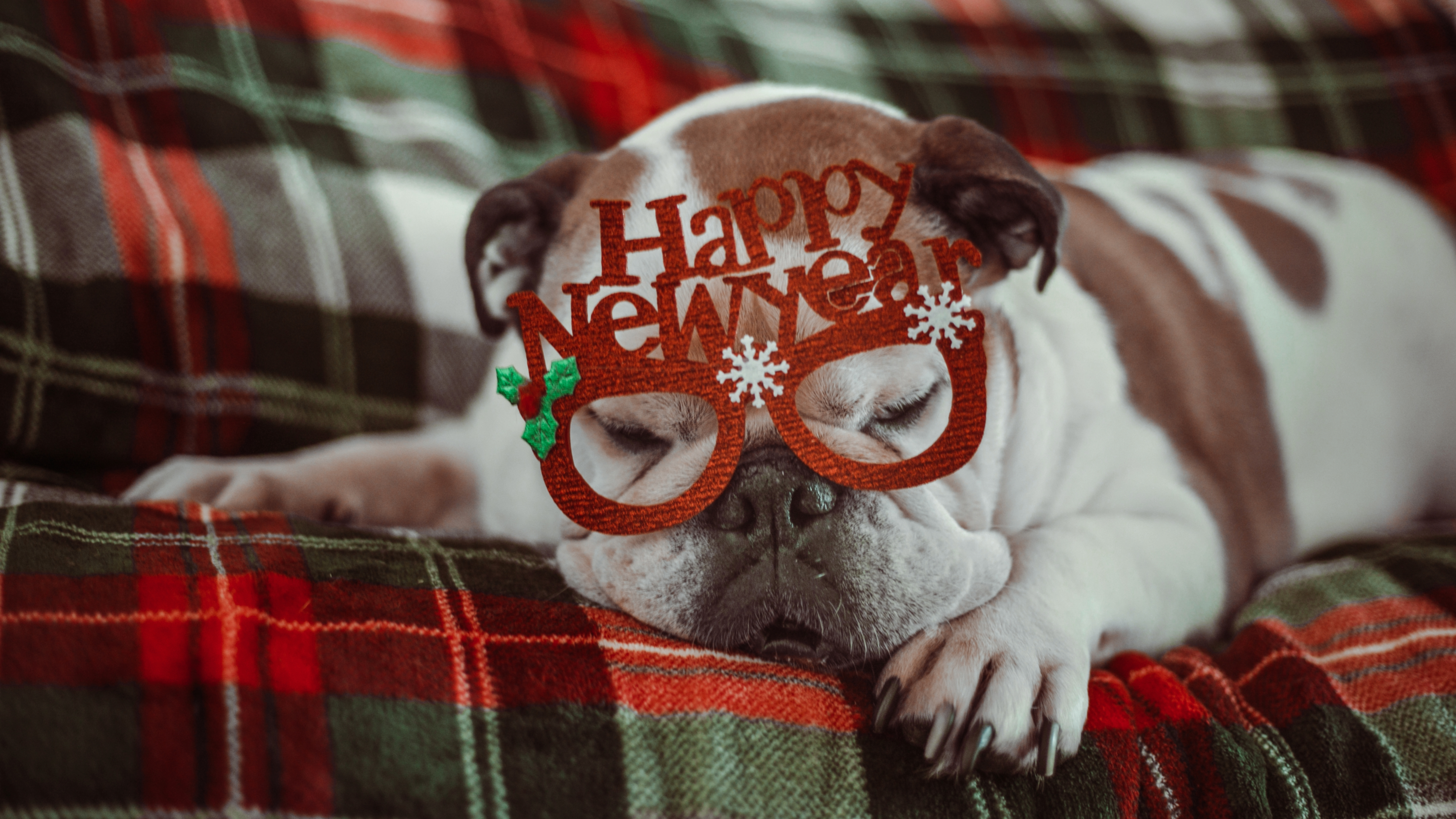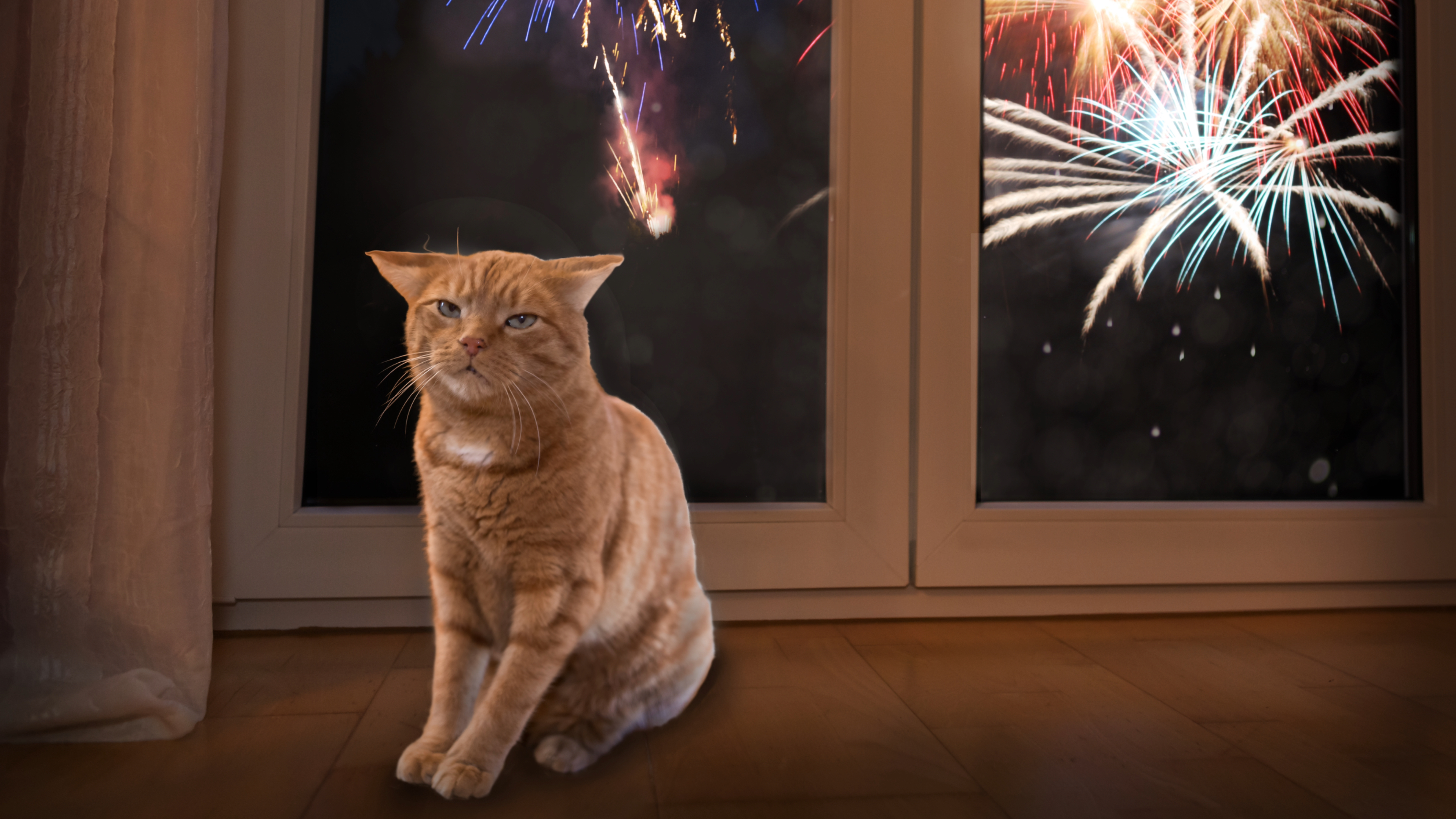
For both people and pets, the holiday season can bring with it a mixed bag of emotions. On the one hand, we may experience moments of joy if we're able to spend time celebrating with family and friends. On the other hand, we may find ourselves feeling more stressed, anxious or overwhelmed by the busyness and the constant need to be 'on'.
It can be easy to think these feelings only apply to us, but our pets experience them too. New Year's Eve can be particularly overstimulating for our fur friends with loud noises from fireworks and music and a lot of extra people potentially visiting or passing by outside. While long lasting dog chews and familiar cat toys can help soothe frazzled nerves, there are additional things you can do to help your pet feel more at ease.
I'm very fortunate in that both my four-year-old cat, Roxy, and my six-month-old kitten, Teddy, seem relatively unphased by loud noises. That may be partly down to the laid-back nature of the British Shorthair and partly down to the fact I'm careful to keep them indoors during these times.
But not all pets will sail through New Year's Eve — and that's okay. Anxiety in dogs and cats is more common than you might think, particularly around the holidays. With that in mind, I reached out to expert vet Dr. Rebecca MacMillan to get her tips on some simple things you can do this New Year's Eve to help your beloved bundle of fluff feel more comfortable.
How to keep your pets safe on New Year’s Eve
Some pets won't bat an eyelid on New Year's Eve. This can be particularly true if you one of the best dogs or cats for extroverts as these breeds tend to have outgoing and highly social natures. For these pets, New Year's Eve might actually be exciting, with parties and outdoor events presenting yet another opportunity to mix and mingle.
But for introverted and quieter breeds, or those who struggle with reactivity and anxiety, New Year's Eve can massively stress an already overwhelmed system. If your pet falls into this category, rest assured, you're not alone – and more importantly, there are things you can do to help.
While the tips below are unlikely to remove your pet's stress or anxiety altogether, what they can do is help to massively reduce it. Here's what Dr. MacMillan recommends when it comes to keeping your pet safe and calm this New Year's Eve.
1. Tire your pet out before the celebrations begin
This tip may sound simple but the benefits are huge. We know that dogs and cats who still have a lot of energy in their system when a stressor hits are more likely to try to let that energy out in ways that may be unsafe – such as running away when loud noises hit or engaging in other harmful behaviors, such as biting, scratching, or chewing furniture.
"By taking your dog for a long walk or encouraging your cat to have a good couple of play sessions, you will help them to feel tired, happy, and relaxed," explains Dr. MacMillan. "A pet that has received some good physical activity in the daytime will be more likely to settle when kept indoors on New Year's Eve."
It's worth investing in a few of the best interactive cat toys and a cat puzzle feeder to give your feline friend's body and brain a good workout before the celebrations kick off. For our canine companions, there are ways to ways to keep dog walks fun and stimulating by adding in scent work and doggy parkour.

2. Take extra care outdoors
While most fireworks go off at midnight, Dr. MacMillan still advises caution earlier in the evening if your dog needs to stretch their legs or go to the toilet.
"If a neighbor starts their celebrations early, this could spook your dog, causing them to panic and run," she says. "By taking your dog out on a leash, you can help to keep them safe. Cats should be shut in at night to avoid accidents, so make sure you lock the cat flap."
3. Create a safe space for pets indoors
While anxiety in cats is not something I've had to deal with when it comes to loud noises, Roxy gets very anxious if she finds herself in a new environment — which happened not so long ago when a family emergency took us away from home for several weeks and we had no choice but to take her with us.
Although it's a different situation, I found that creating a super inviting space for Roxy in her temporary home went a long way in helping to soothe some of the stress she was feeling. Investing in one of the best cat trees was a real lifesaver as she took to it like a duck to water and it became her secure base.
Regardless of whether you have a dog or a cat, setting up a cozy safe space for them indoors can really help to dampen down their body's stress response.
"Draw your curtains and create a den with a blanket draped over some chairs or their crate," Dr. MacMillan suggests. "You could try filling it with their favorite toys and treats. This should ideally be set up a few days in advance so that your pet has time to explore their new cozy den ahead of New Year's Eve."

4. Don't leave them home alone
If you have a confident pet who you know is unperturbed by loud noises, then you may decide that leaving them at home for a few hours by themselves isn't going to be an issue. However, Dr. MacMillan cautions against this for pets who are easily spooked.
"Don’t leave anxious pets home alone on New Year's Eve. Fireworks and loud party music can cause some animals to panic and injure themselves. Having you there as a calming influence will help to reassure your pet that all is well."
5. Keep them away from dangerous substances
If you are home for New Year's Eve, Dr. MacMillan says to make sure your pet doesn’t get hold of any of your celebration nibbles.
"Many human foods can be toxic to animals including chocolate, grapes, raisins, onions, artificial sweeteners (xylitol), and alcohol. Even if they eat something safe, rich human food can still lead to tummy troubles," she explains.
"Keep all party food well out of reach and never leave it unattended. If you are having a party, you may want to consider zoning your pet into a safe area of the house to de-risk things further."
You might also find it helpful to read up on the human food cats can eat and the human food dogs can eat so you're aware of what's safe and what's not.
How to prepare your pet for New Year’s Eve

There's a lot you can do on New Year's Eve itself to help keep your pet calm, but there are also plenty of things you can start well in advance of the big day to prepare your fur friend for all that noise.
For many pet parents, figuring out how to calm a dog during fireworks or calm a cat during periods of high anxiety is at the top of the list and thankfully, Dr. MacMillan has some great tips to help with that.
"You can try some sound desensitization training in the run-up, to get your pet used to the noise of fireworks," she explains. "Start playing these sounds at very low volume on your computer or stereo, while you go about your daily routine. Gradually increase the volume over time, checking that your pet is comfortable with each adjustment. This will help them to cope much better with the real thing."
If you're going to be setting up a cozy den for your pet, Dr. MacMillan recommends doing this a few days before New Year's Eve so that they have a chance to explore it ahead of the event.
"They will feel more like hiding in there at midnight if they are already familiar with it," she says. "If you are considering using any calming agents like plug-in pheromones or calming supplements these usually need to be started in advance of the fireworks. Check the manufacturer's guidelines on this."
Dr. MacMillan also recommends that dog and cat owners try to keep their pet’s routine as normal as possible around New Year's Eve.
"Make sure they receive their meals at the right time and that they have had the opportunity to toilet and exercise ahead of any celebrations. This will help them to feel less anxious.
"Your pet should be microchipped, with your up-to-date details on it. This will help increase the chances of your being reunited if your pet panics and escapes on New Year's Eve. When hosting a party, somebody usually leaves the door open at some point and escapes can happen."
There are lots of ways to support a scared or anxious pet, so do give the above tips a try if your feline friend or canine companion finds New Year's Eve particularly stressful. While they may not remove these feelings altogether, they can help make this time a lot more bearable for your pet – and for you, too.
Looking for more advice and suggestions? We find out, do calming treats for dogs work? And here's our roundup of the best calming cat collars, which may help reduce anxiety.







